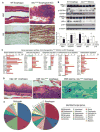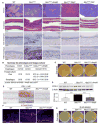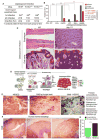Autoreactive T Cells and Chronic Fungal Infection Drive Esophageal Carcinogenesis
- PMID: 28407484
- PMCID: PMC5868740
- DOI: 10.1016/j.chom.2017.03.006
Autoreactive T Cells and Chronic Fungal Infection Drive Esophageal Carcinogenesis
Abstract
Humans with autoimmune polyendocrinopathy-candidiasis-ectodermal dystrophy (APECED), a T cell-driven autoimmune disease caused by impaired central tolerance, are susceptible to chronic fungal infection and esophageal squamous cell carcinoma (ESCC). However, the relationship between autoreactive T cells and chronic fungal infection in ESCC development remains unclear. We find that kinase-dead Ikkα knockin mice develop APECED-like phenotypes, including impaired central tolerance, autoreactive T cells, chronic fungal infection, and ESCCs expressing specific human ESCC markers. Using this model, we investigated the link between ESCC and fungal infection. Autoreactive CD4 T cells permit fungal infection and incite tissue injury and inflammation. Antifungal treatment or autoreactive CD4 T cell depletion rescues, whereas oral fungal administration promotes, ESCC development. Inhibition of inflammation or epidermal growth factor receptor (EGFR) activity decreases fungal burden. Fungal infection is highly associated with ESCCs in non-autoimmune human patients. Therefore, autoreactive T cells and chronic fungal infection, fostered by inflammation and epithelial injury, promote ESCC development.
Keywords: EGFR; IKKalpha; autoimmune disease; autoreactive T cells; esophageal squamous cell carcinoma; fungal infection; inflammation; mucosal epithelium.
Published by Elsevier Inc.
Figures







References
-
- Akiyama T, Maeda S, Yamane S, Ogino K, Kasai M, Kajiura F, Matsumoto M, Inoue J. Dependence of self-tolerance on TRAF6-directed development of thymic stroma. Science. 2005;308:248–251. - PubMed
-
- Akiyama T, Shimo Y, Yanai H, Qin J, Ohshima D, Maruyama Y, Asaumi Y, Kitazawa J, Takayanagi H, Penninger JM, et al. The tumor necrosis factor family receptors RANK and CD40 cooperatively establish the thymic medullary microenvironment and self-tolerance. Immunity. 2008;29:423–437. - PubMed
-
- Anderson MS, Venanzi ES, Klein L, Chen Z, Berzins SP, Turley SJ, von Boehmer H, Bronson R, Dierich A, Benoist C, et al. Projection of an immunological self shadow within the thymus by the aire protein. Science. 2002;298:1395–1401. - PubMed
-
- Cao Y, Bonizzi G, Seagroves TN, Greten FR, Johnson R, Schmidt EV, Karin M. IKKa provides an essential link between RANK signaling and cyclin D1 expression during mammary gland development. Cell. 2001;107:763–775. - PubMed
MeSH terms
Substances
Grants and funding
LinkOut - more resources
Full Text Sources
Other Literature Sources
Medical
Molecular Biology Databases
Research Materials
Miscellaneous

